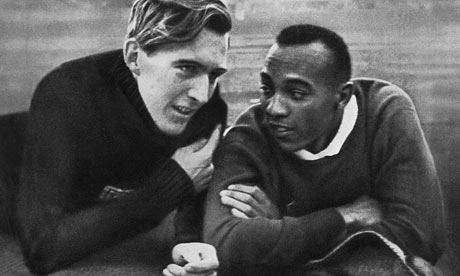The Ten Most Sporting Moments

US champion Jesse Owens (R) and German champion Lutz Long (L) chat together in the Berlin stadium 1st August 1936. Photograph: AFP
1. Lutz Long
Long jump, Olympics (1936)
German long jumper Lutz Long was hoping to win gold at the Berlin Games, where his main rival was the black American Jesse Owens. With Hitler watching, Owens foot-faulted twice in the qualifying round and was at risk of disqualification when Long suggested that he mark out his run again. Owens won gold, with the German landing silver. "You can melt down all the medals and cups I have won," Owens said afterwards, "and they wouldn't be worth the plating on the 24-carat friendship I felt for Lutz Long at that moment."
2. Jack Nicklaus
Ryder Cup (1969)
"I didn't think you were going to miss that putt, but I didn't want to give you the opportunity," - Jack Nicklaus's words to Tony Jacklin at the final hole of the 1969 Ryder Cup at Royal Birkdale have entered golfing folklore. At the 18th, in the most competitive tournament the decade had seen, the young Englishman was left with a two-foot putt to tie the match, knowing that if he missed it, the Cup would once again go to the US. To the fury of his team-mates, Nicklaus conceded the putt.
3. Andrew Flintoff
Second Test, the Ashes (2005)
The 2005 Test at Edgbaston was one of the most nerve-shredding cricket matches ever played, ending in a two-run victory for England - the narrowest margin in Ashes history. As the crowd celebrated, Andrew Flintoff spotted Brett Lee - who had withstood a barrage of brutish deliveries from the bowler - slumped in defeat, and offered him a consoling handshake. The TV cameras missed the moment, but it is commemorated in one of the most famous of sporting photographs.
4. John Landy
1500m, Australian championships (1956)
Roger Bannister's long-time rival, Australian distance runner John Landy had come agonisingly close to running the first four-minute mile two months before Bannister's feat in 1954. He was targeting the world mile record again, in 1956, when Ron Clarke, who was heading the field, stumbled and fell. As the other runners streamed past, Landy stopped, jogged back to help the other man to his feet, then won the race, finishing just six seconds outside the world record.
5. Stirling Moss
Portuguese Grand Prix (1958)
Acknowledged as the greatest racing driver never to have won the world drivers' championship, Stirling Moss would have won the 1958 title but for an act of gallantry during the Portuguese GP. His rival Mike Hawthorn was about to be docked points after his car spun off the track; Moss, who had witnessed the incident, insisted at the post-race disciplinary tribunal that Hawthorn had done nothing wrong. Hawthorn was reprieved and beat Moss to the world title by a single point.
6. Paolo di Canio
West Ham v Everton (2000)
Football bad boy Paolo di Canio, who famously said "I'm not a racist, I'm a fascist", was on the side of the angels when playing for West Ham against Everton in December 2000. The score was tied at 1-1 and the match was drifting into injury time when Di Canio had the chance to shoot into an empty net as a cross came in from the right wing. Many other Premiership players would have headed the ball home, but he caught the ball, having spotted that the Everton goalkeeper, Paul Gerrard, was lying on the ground injured. The game ended 1-1.
7. Mark Taylor
Australia v Pakistan (1998)
In a Test in Peshawar in 1998, Australian captain Mark Taylor stood on the threshold of greatness. He was 334 not out at the end of the second day, equalling the best Test score by an Australian batsman, set by Don Bradman in 1930. On a flat pitch, Taylor had the opportunity not only to overtake The Don but also to challenge Brian Lara's world record 375. But he declared overnight, more interested in pressing for an Australian victory than chasing personal glory. As it was, the game was drawn.
8. Judy Guinness
Fencing, Olympics (1932)
At the 1932 Olympics in Los Angeles, Judy Guinness stood to become the first ever Briton to win fencing gold. She was just 21, so it would have been a remarkable feather in her cap. But she was too young to have become streetwise in competition: after a closely contested final against Austrian Ellen Preis, Guinness was declared the winner by the judges, but she pointed out to them that they had missed two hits by her opponent. Guinness's honesty cost her the gold medal.
9. Bobby Jones
Golf, US Open (1925)
The great American golfer Bobby Jones won 13 majors between 1923 and 1930, and would have won 14 but for an incident in the 1925 US Open. In the first round, having hit his drive at the 10th into the rough, Jones was addressing his ball when it moved fractionally. Nobody else had noticed, but Jones called a one-stroke penalty on himself. He lost the tournament by the same margin. Congratulated afterwards on his honesty, he replied: "You might as well praise a man for not breaking into banks."
10. Irene Tidball
Wales v Germany (2008)
Welshwoman Irene Tidball, 73, enjoyed her 15 minutes of fame in October 2008, when she dropped everything to drive her son-in-law 500 miles to a football match. Gwilym Rees was planning to travel from Cardiff to Mönchengladbach to watch Wales play Germany in a World Cup qualifier, but missed the supporters' coach. As he could not afford a plane ticket, Mrs Tidball gallantly drove him all the way to Germany via Dover - kicking mother-in-law jokes into touch.




0 Responses to The Ten Most Sporting Moments
Post a Comment